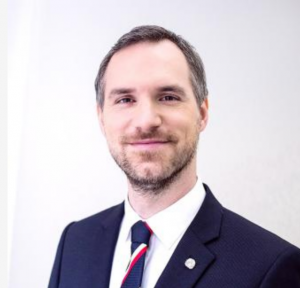FEATURE: Zdenek Hrib: The mayor who defies China
Source: Taipei Times / www.taipeitimes.com / By The Guardian /
Zdenek Hrib had been Prague’s mayor for little more than a month when he went face-to-face with the Czech capital’s complex entanglement with China.

Hosting a meeting with foreign diplomats in the city, Hrib was asked by the Chinese ambassador to expel their Taiwanese counterpart from the gathering in deference to Beijing’s “one China” principle.
Given Chinese investments in the Czech Republic — including the acquisition of soccer club Slavia Prague, a major brewery and a stake in a private TV station — the fledgling mayor could have easily agreed.
The Prague City Council had, under his predecessor, signed a twin cities agreement with Beijing that explicitly recognized the “one China” principle.
Instead, Hrib refused and the Taiwanese diplomat stayed.
The episode was a rare case of a local politician defying the might of a global superpower while making a principled stand against a national government policy that has promoted Chinese ties.
Hrib’s conduct has invited comparison with former Gdask mayor Pawe Adamowicz, after whom he renamed a Prague street following Adamowicz’s murder in January.
Adamowicz offered his city as a haven for refugees and adopted liberal positions at odds with the policies of Poland’s conservative Law and Justice Party government.
Hrib has since gone further, demanding that Beijing officials drop the clause stating Prague’s support for the “one China” principle in the 2016 deal and threatening to scrap the arrangement if they refuse.
“This article is a one-sided declaration that Prague agrees with and respects the ‘one China’ principle and such a statement has no place in the sister cities agreement,” Hrib said in an interview in Prague’s new town hall, close to the city’s historic tourist district, which has drawn an increasing number of visitors from China.
“The ‘one China’ principle is a complicated matter of foreign politics between two countries, but we are solving our sister cities relationship on the level of two capital cities,” he added.
Hrib, a 38-year-old doctor who spent a medical training internship in Taiwan, is challenging Czech President Milos Zeman, who has visited China several times, installed a Chinese adviser at his office in Prague Castle and declared that he wanted to learn “how to stabilize society” from China’s communist rulers.
The dispute has catapulted unassuming Hrib to household name status in Czech politics, helped by Prague’s position as an international cultural draw and its outsize share of national resources.
Hrib’s rise from obscurity is striking because Czech mayors are not directly elected.
He became mayor of a coalition administration after his Czech Pirate Party, a liberal group with roots in civil society, finished second in municipal elections in October last year.
Hrib has said that he is merely adopting the policy of his party and its two coalition partners in taking decisions that are cooling Prague’s relations with Beijing.
In March, his administration restored the practice of flying the Tibetan flag from Prague’s town hall, reinstating a tradition begun in the era of the Czech Republic’s first post-communist president, Vaclav Havel, which was dropped by the previous city administration.
At the same time, in a move tailor-made to infuriate Beijing, Hrib hosted the visiting head of Tibet’s government-in-exile, Lobsang Sangay.

